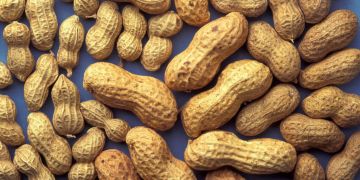China is the top producer of peanuts. In fact, it is estimated that 41.5 percent of the peanuts in the world are cultivated in China. India produces 14.2 percent of the world’s peanuts, and the United States produces 6.8 percent of the world’s peanuts.
Health Benefits of Peanuts
One of the reasons that people choose to ingest peanuts or peanut oil is because of the numerous health benefits. Below are some of the potential benefits that can be reaped from eating peanuts:
Helps Reduce The Risk of Neural Tubal Defects (NTDs)
A pregnant woman needs to get at least 400 milligrams of folic every day. Studies have shown that women who get adequate amounts of folic acid are 70 percent less likely to deliver a baby that has a neural tubal defect. Peanuts are an excellent source of folic acid. Therefore, peanuts can potentially help protect against neural tubal defects.
Helps Reduce The Risk of Gallstones
As strange as it may sound, peanuts can actually help protect against gallstones. There have been studies done to confirm that people who eat peanuts or peanut butter on a regular basis are less likely to develop gallstones. In fact, peanuts and peanut butter can reduce a person’s risk of developing gallstones by up to 25 percent.
Helps Lower Cholesterol
Peanuts are an excellent source of copper. Copper is a nutrient that has been shown to reduce cholesterol. It also helps raise good cholesterol.
Reduce The Risk of Heart Disease
One of the keys to preventing heart disease is to eat the right foods. Peanuts are one of the many foods that can help protect against this condition. Studies have shown that people who eat peanuts at least four times a week are less likely to develop heart disease. Furthermore, peanuts are filled with antioxidants and healthy fats that can protect against heart disease.
Protect Against Alzheimer’s Disease
Alzheimer’s disease is a major problem that affects 13 percent of people who are over the age of 65. Even though this condition typically only affects older people, it is becoming increasingly common in men and women who are under the age of 40. Vitamin B2, or riboflavin, has been shown to protect against Alzheimer’s disease. Peanuts are an excellent source of riboflavin. People who eat vitamin B2-rich foods like peanuts on a regular basis are 70 percent less likely to develop Alzheimer’s disease.
Prevent Weight Gain
Peanuts are relatively high in calories, so you may be surprised to hear that they can prevent weight gain. However, studies have shown that people who consume peanuts twice a week are less likely to gain weight than people who do not eat any peanuts at all.
Protect Against Cancer
Peanuts contain beta-sitosterol, which is a type of phytosterol. Phytosterols have been shown to help prevent tumors from growing.
Increases Memory
Peanuts are abundant in vitamin B3, or niacin. Niacin is a nutrient that has been shown to help boost memory. That is why peanuts are often called a brain food. Vitamin B3 can also help promote normal brain functioning.
How to Take
Of course most people eat peanuts raw, roasted or salted. The oil from peanuts is also available in the form of a supplement. It can be ingested or applied topically to the skin. Peanut oil is very safe for the majority of people to use unless a person is allergic to peanuts or soybeans.





